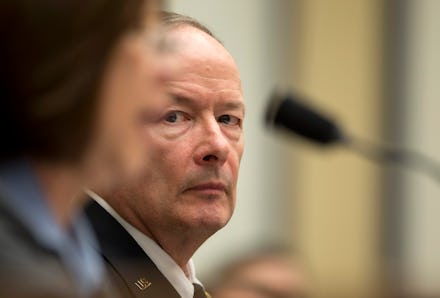Here Are the 13 Creepiest Privacy Violations the NSA Didn't Want You To See

With millions of Americans preoccupied by travel and holiday gatherings, the National Security Agency on Wednesday quietly revealed a series of long-classified internal reports detailing thousands of embarrassing and unlawful violations by its own employees.
By releasing the documents on Christmas Eve, when so many people are away from their computers and TVs, the NSA was doing its best to hide its crimes in plain sight.
The agency, made infamous for its systemic abuse of Fourth Amendment privacy rights by contractor-turned-whistleblower Edward Snowden, only disclosed the heavily redacted documents in response to a Freedom of Information Request by the American Civil Liberties Union. The pages cover a nearly 12-year period beginning after the Sept. 11, 2001, terror attacks.
Note: It is illegal for the government to monitor or record data from citizens, lawful permanent residents or certain protected groups, like U.S.-based corporations, without a court order. Those people and organizations are referred to as "U.S. Persons" below.
Here are the 13 of the worst violations the NSA did not want you to see.
1. One analyst used NSA tools to spy on her husband
We don't know exactly how often this happens, just that it's often enough to inspire the spy community to create a cheeky code for it: LOVEINT.
2. Former NSA director Gen. Keith Alexander ordered a subordinate to unlawfully search the database on his behalf.
3. One analyst confessed to using NSA tools to spy on his foreign girlfriend.
This is one of a number of previously known abuses of power. As NBC News reported last year, "National Security Agency employees improperly eavesdropped on the phone calls of girlfriends, boyfriends, husbands, wives and spouses and engaged in other 'intentional' abuses of their authority on 12 occasions since 2003."
4. The military conducted an unauthorized search of the NSA database.
5. How many times did NSA analysts "inadvertently" target Americans? Redacted!
The redactions make it nearly impossible to quantify the extent of the violations. Likewise, there is no real evidence the information obtained was permanently discarded.
6. Multiple analysts shared privileged info on Americans with random individuals.
But no worries, folks, those emails and chat room comments have all been "recalled."
7. One analyst crossed a "U.S. Person" off a surveillance list, but another who was out of the office that day added the person back.
They can read your emails, but evidently don't always see their own.
8. Analysts shared full U.S. telephone numbers with unknown government workers or agencies.
Again, the recipients of those phone numbers were asked to destroy the information. And again, they promised they had.
9. Analysts believed Americans were "foreign intelligence targets" because they never checked their citizenship.
Because the documents are so heavily redacted, we don't know why these individuals were targeted. It is, however, probably fair to assume the targets weren't named "Smith" or "Jones."
10. The NSA gave information about a U.S. Person to an unknown foreign government.
11. At least one analyst searched his own phone number.
You can read this one of two ways: Either the analyst is doing the spy equivalent of dropping his bare bottom on the company photocopy machine or he's concerned or interested in what he can find out about a person conducting a simple search on their phone number. Both are more than a little concerning.
12. One analyst changed jobs but kept checking the NSA database anyway.
13. An instructor taught analysts how to use search tools by entering his friend's phone number.
Congress granted U.S. surveillance agencies historic powers in the aftermath of the 9/11 attacks. The laws that govern their actions, often classified or enforced at the leisure of the executive branch, are lax and increasingly outdated. There is, even now, little accountability beyond the walls of the institutions themselves.
"The government conducts sweeping surveillance under this authority — surveillance that increasingly puts Americans' data in the hands of the NSA," Patrick C. Toomey, an attorney with the ACLU's National Security Project, told Bloomberg after the documents were finally made public. "Despite that fact, this spying is conducted almost entirely in secret and without legislative or judicial oversight."
The NSA will claim it has come clean, but the very fact of their decision to release the information on Christmas Eve — when they knew fewer Americans would be watching or reading the news — shows just how much they still have to hide.